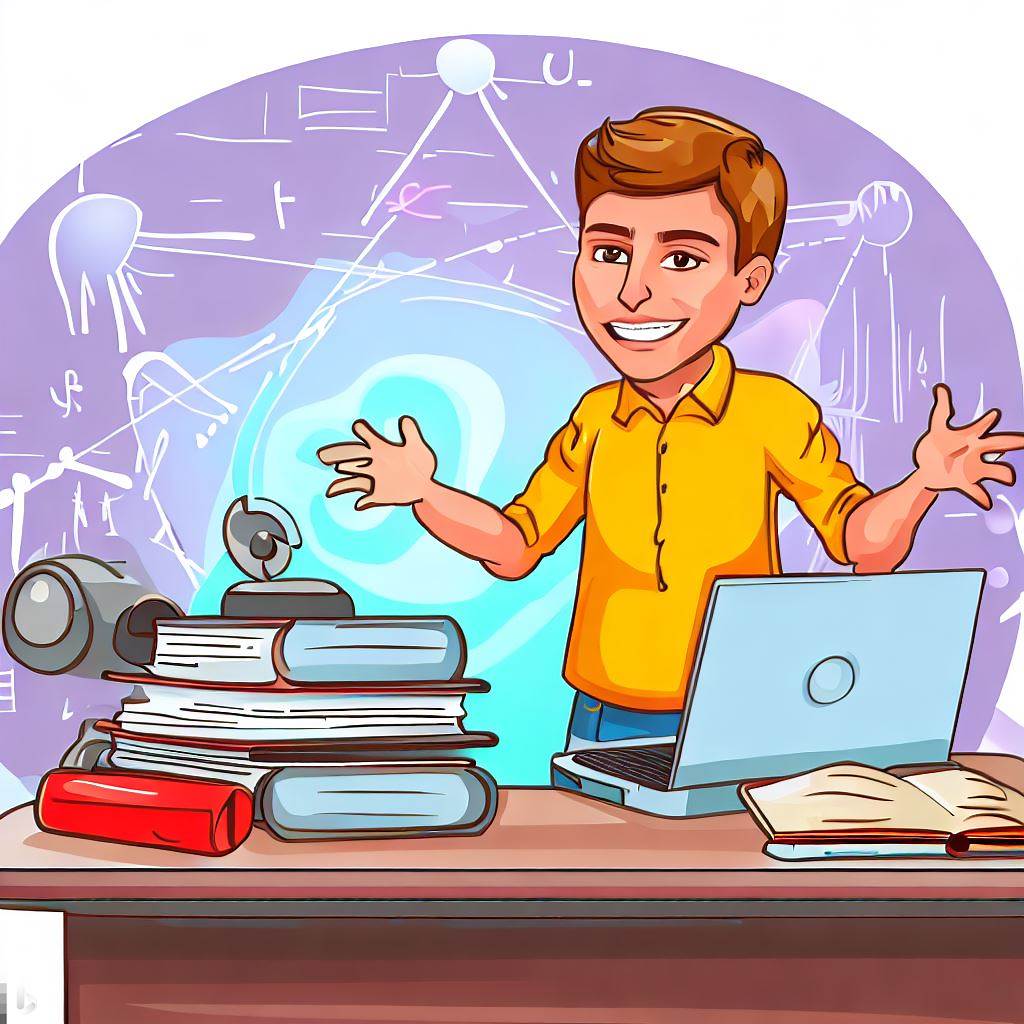Guide to Work on Group Physics Assignments - Learning and Working Effectively as Part of a Team

Group physics assignments give students a special chance to improve their academic performance and forge crucial teamwork skills. Peer collaboration enables the discussion of various viewpoints, the sharing of workload, and the exchange of ideas, all of which contribute to a deeper comprehension of the subject at hand. Effective group work, however, necessitates meticulous planning, transparent communication, and the capacity to overcome potential obstacles.
The guide that follows will cover the strategies and tactics that enable you to successfully complete your physics assignment. By putting these strategies into practice, you'll not only make a significant contribution to your team's success but also improve your own learning outcomes.
For a successful collaboration, it is essential to comprehend the dynamics of group work. Every team member brings different ideas, strengths, and weaknesses to the table. Accepting diversity within the group encourages innovation and critical thinking, which leads to thorough problem-solving. To ensure a smooth workflow and prevent conflicts, clear roles and responsibilities should be established from the start.
Effective group work is built on effective communication. Regular meetings enable the discussion of ideas, the resolution of questions, and the reporting of progress. Maintaining a positive and productive environment within the team requires active listening, respect for different viewpoints, and constructive criticism.
It's crucial to create a coordinated plan of action when working on group assignments. Start by segmenting the assignment into manageable tasks and distributing responsibilities in accordance with each person's strengths and preferences. A timeline for completion and deadlines for each task will help the team stay accountable and focused.

Knowing the Value of Collaboration in Physics Assignments:
There is a proverb that states, "Two heads are better than one." This idea serves as the cornerstone for many group projects in the classroom. Collaboration is especially advantageous in the complex and frequently difficult field of physics. Group projects give students the chance to collaborate, play to each other's strengths, and work through more challenging issues than they could individually. These assignments not only promote academic development but also the development of vital life skills that are essential in the working world, such as teamwork, communication, and problem-solving.
Students must comprehend and apply complicated theories, principles, and equations when working on physics assignments. This frequently entails decomposing the issue into smaller, more manageable components, using the proper formulas, and interpreting the outcomes in light of the physical universe. A single student may find these tasks to be overwhelming, but a well-organized team can divide the workload, cross-verify the solutions, and benefit from one another's insights. Furthermore, communicating one's thought process to others helps to clarify concepts and identify any potential misunderstandings.
Students must comprehend and apply complicated theories, principles, and equations when working on physics assignments. This frequently entails decomposing the issue into smaller, more manageable components, using the proper formulas, and interpreting the outcomes in light of the physical universe. A single student may find these tasks to be overwhelming, but a well-organized team can divide the workload, cross-verify the solutions, and benefit from one another's insights. Furthermore, communicating one's thought process to others helps to clarify concepts and identify any potential misunderstandings.
Group assignments have their advantages, but they also have their share of difficulties. The educational goals of the assignment can occasionally be overshadowed by coordinating schedules, adhering to the same work ethics, distributing the workload fairly, and controlling group dynamics. Because of this, it's essential to approach group projects deliberately and strategically, making sure that both the learning and teamwork aspects are well-addressed.
Effective Teamwork Techniques for Physics Assignments:
A group assignment can only be completed successfully with a cohesive team. But how can productive teamwork be ensured? There are numerous tactics that can be useful.
Establishing clear communication is the first step. The foundation of effective teamwork is effective communication. Early on, it is crucial to establish clear communication channels and standards. This might entail selecting a common discussion forum, scheduling regular meeting times, and making sure everyone feels comfortable expressing their ideas and opinions.
The fair and thoughtful division of labor is another crucial tactic. Numerous elements are frequently included in physics assignments, including theoretical comprehension, mathematical calculations, data analysis, report writing, etc. This can be accomplished by evaluating the strengths and interests of each team member and allocating tasks accordingly. This guarantees a just distribution of labor and raises the level of output.
The third tactic entails consistently evaluating and integrating work. The pieces must fit together cohesively even when each team member is working on a different component. Regular meetings can help keep everyone on the same page and ensure the assignment moves along smoothly by providing updates on progress, discussing obstacles, and integrating work.
A proactive approach to conflict resolution is crucial. Conflicts in group assignments can arise from differences in opinion, working methods, or levels of commitment. It's crucial to deal with these right away in a positive way to prevent the team's progress from being impeded.
Using Group Dynamics:
Group projects are a test of both academic skills and interpersonal relationships. Group assignments can be much more effective and enjoyable if these dynamics are handled well.
First and foremost, it's crucial to create a supportive workplace culture. Respecting one another's opinions, being receptive to criticism, and maintaining a collaborative rather than competitive mindset are necessary for this. Remember that everyone's participation is crucial to achieving the goal of collective success.
Additionally, encouraging participation can guarantee a balanced contribution from each member. The conversation may occasionally be dominated by some members while being held in check by others. A more inclusive atmosphere can be produced by making sure that everyone has an opportunity to speak, encouraging more reserved participants, and valuing each person's contributions.
Finally, utilizing diversity can significantly improve the group's output. Each team member brings a distinctive perspective, and the variety of these perspectives can result in more creative solutions. The best ideas from everyone's contributions can be combined to produce a solution that is greater than the sum of its parts.
Resources and Tools for Group Assignments in Physics:
We now have many tools thanks to the digital age that make group projects much easier. Collaboration on report writing is made simple by platforms like Google Docs that enable multiple users to work on a document at once. It can be especially helpful in physics to visualize issues and solutions using digital whiteboards and diagramming software. When face-to-face meetings are not possible, communication is facilitated by online meeting platforms.
Online physics forums and communities can be a great place to discuss difficulties and doubts in terms of resources. For learning and comprehending physics concepts, there are also a ton of online resources available, ranging from video tutorials and lectures to interactive simulations.
Increasing Physics Understanding through Group Assignments:
The chance they give students to better understand complex physics concepts is one of the group physics assignments' most important advantages. This process frequently moves beyond simple individual understanding and explores the worlds of shared knowledge and group enlightenment.
Each group member contributes their unique understanding and interpretation to the work being done on an assignment. As a result, different viewpoints are combined, providing a more comprehensive understanding of the subject at hand. One student's explanation of the fundamentals of quantum mechanics, for instance, can broaden the group's comprehension and enable everyone to comprehend the subject's complexities on a deeper level.
Furthermore, one of the best ways to strengthen one's own understanding is to impart knowledge or explain a concept to another person. Students frequently discover that they have a deeper, more comprehensive understanding of the subject after explaining the fundamentals of physics to their classmates. Deeper learning and retention are aided by this dual role of teacher and learner.
Applying Physics Principles to Situations in the Real World:
Group physics projects frequently involve the practical implementation of theoretical concepts, which can significantly improve students' ability to connect physics concepts to everyday situations. Students can collaborate on experiments, run simulations, or work through challenging puzzles that resemble real-world scenarios.
For instance, a group project might ask students to build an electrical circuit, use thermodynamics to design an energy-efficient building, or examine a projectile's trajectory. These assignments force the team to put their theoretical understanding into practice and aid in their understanding of the implications and uses of physics in daily life.
Students can investigate various approaches to a given scenario, evaluate their efficacy, and select the best solution collectively through group discussions and problem-solving. This process develops their critical thinking and decision-making abilities in addition to improving their understanding of physics.
Through group projects, interpersonal skills are improved:
Group projects teach students how to interact with others in a positive and respectful way in addition to teaching them physics. Strong interpersonal abilities, such as communication, negotiation, and conflict resolution, are necessary for productive teamwork.
Perhaps the most important group assignment skill is communication. Students are expected to express their ideas clearly, pay attention to others, and offer helpful criticism. Additionally, they must effectively coordinate their efforts to guarantee that the group's goals are achieved. These communication skills, which were developed through group projects, are highly valued in the workplace.
Both negotiation and conflict resolution abilities are crucial. Differences in opinion are common in group assignments, so it's important for students to learn how to handle them positively. They must develop the ability to respect opposing points of view, look for common ground, and, when necessary, make concessions. These abilities can support group harmony and guarantee an effective working environment.
Conclusion:
Group physics project work can be difficult, but with the right attitude and approach, it can also be a tremendously rewarding experience. You can harness the power of teamwork to produce outstanding results by being aware of the dynamics of group work, encouraging effective communication, and putting a well-defined plan into practice.
Working together with classmates provides the chance to consider various viewpoints, gain knowledge from one another, and develop critical abilities that go beyond physics. Effective group work improves the skills that are highly valued in academic and professional settings, such as problem-solving, critical thinking, time management, and adaptability.
We have emphasized the value of clear communication, attentive listening, and respectful teamwork throughout this guide. These components foster an atmosphere in which concepts can develop and team members can each offer their particular strengths. You can improve your own learning while fostering a sense of camaraderie and mutual support within your team by embracing diversity and making use of the group's collective intelligence.
It's important to keep in mind that group physics assignments offer you the chance to develop as a learner and gain skills that will help you in both your academic and professional careers. Accept the challenges, maintain organization, communicate clearly, and honor your team's accomplishments. You can succeed in group physics assignments and produce a worthwhile learning experience for everyone involved with hard work and cooperation